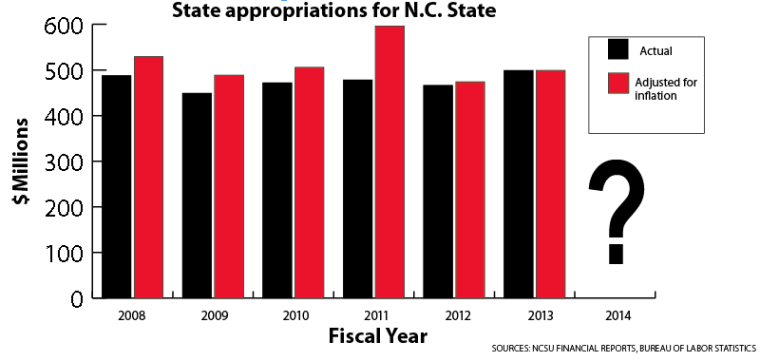The N.C. General Assembly approved the state’s $20.6 billion budget Wednesday after months of heated debate.
The House voted 65-53 and the Senate voted 32-17 to approve the measure, which now awaits Gov. Pat McCrory’s signature, according to the WRAL.
State lawmakers have met considerable backlash in recent months in response to proposed cuts to the state’s public schools—many of which remain in the current budget.
McCrory released his budget proposal in March, suggesting a $138.5 million cut to the UNC System. The governor also hinted at closing some UNC System campuses or consolidating programs to save money.
The State Senate recommended $50 million in cuts in its proposal released in May.
The House’s proposed cuts were similar in scope to McCrory’s, recommending a reduction of more than $120 million.
While the current cuts to the system were reduced to $66 million in the final version of the budget, they will be added to the long-term $400 million budget reduction handed down two years ago—something opponents say will have drastic consequences for education.
“I worry about the impact additional reductions will have on our ability to provide high-quality educational opportunities to our residents and to assist in North Carolina’s economic recovery,” UNC System President Tom Ross said in a March press release after McCrory announced his budget.
Exactly how much of the $66 million cut each school in the system will have to absorb is up to the UNC Board of Governors.
The budget also raises tuition by 12.3 percent for out-of-state students at the UNC School of the Arts, N.C. A&T State, UNC-Chapel Hill and UNC-Wilmington. Other schools, including N.C. State, will institute a 6 percent increase for those students, according to the News & Observer.
Tuition for community colleges will also be raised.
While higher education is clearly being hit hard by a strained budget, the impact to public education in general in North Carolina is more difficult to discern.
The budget offers no raises to teachers but will spend $120 million on teacher assistants.
Likewise, the budget will stop giving salary boosts to teachers with advanced degrees but will spend $10 million in grants for low-income students to go to private schools.
The budget also changes how the state deals with crime, affecting both law enforcement and the prison system.
Lawmakers want to close minimum and medium-security prisons in Bladen, Duplin, Robeson and Wayne counties in addition to several institutions for young offenders, including two juvenile detention centers in Buncombe and Richmond counties.
The move will eliminate more than 800 jobs and will save the state almost $30 million, according to the News & Observer.
However, the state also wants to provide funding to fill vacant state trooper jobs, costing $2.5 million.








